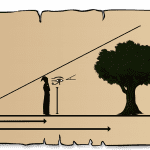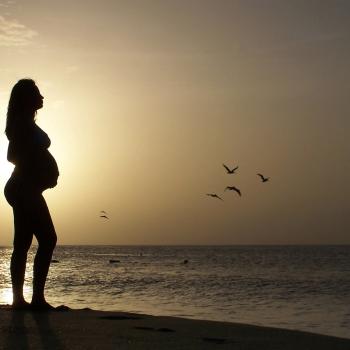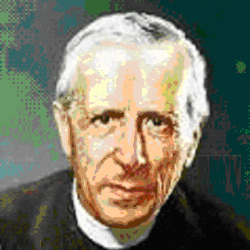My mother Marie’s favorite prayer was “Hail, Holy Queen,” recited at the end of the Rosary, a tribute to Mother Mary, the center of her prayer life. This medieval prayer by its Latin name, Salve Regina, is attributed to Hermann von Reichenau (1013-1054 A.D.), a German monk who suffered from paralysis beginning in early childhood. I listened to my mother recite this prayer daily. With such frequent recitations, the prayer could seem automatic at times, but inevitably reached a crescendo of feeling with the line,
“To thee do we cry, poor banished children of Eve, to thee do we send up our sighs, mourning and weeping in this valley of tears.”
To my child’s mind, I understood why this might be, why my mother had these deep emotions. We did indeed live in “a valley of tears.” Funerals came frequently. By the time I was eight, my mother, one of ten children, had buried her mother, my grandmother and great grandmother, three brothers, and a 12-year-old nephew, all well before “their time.” Life was unsafe, unpredictable, chaotic and full of suffering. For my mother, we (and all humans) were “poor banished children of Eve.” It colored her view of the world. My child’s mind wanted to ask, with all this suffering happening daily in our chaotic world, maybe this world itself is purgatory- enough?
According to the Catholic Encyclopedia, “purgatory comes from the Latin ‘purgare’ to make clean, to purify. In accordance with Catholic teaching, it is a place or condition of temporal punishment for those who, departing this life in God’s grace, are not entirely free from venial faults, or have not fully paid the satisfaction due to their transgressions.” To us young children being introduced to the dark blue Baltimore catechism book for the first time, purgatory appeared to involve only a little less fire than Hell, and was, of course, “temporary,” which remained undefined. The notion of “satisfaction due,” and “to whom?” became troublesome in later years.
Here I am many decades later and I find that my child question remains. Often I find in writing a blog that two seemingly unconnected ideas somehow “want” to be put side by side for a deeper look. So it is here, looking at the notion of fire and purification from two very different sources.
The idea of “purgare” meaning to clean, to purify, seems somehow inadequate to me for a soul entering heaven. It must mean more than cleaning, than purifying – like erasing smudges from a pure white soul that the nuns had us imagine. It is rather an alchemical process, a process of transformation, well beyond a return to the childhood innocence of the English Romantic poets. For this, I turn to the words of a mystic for illumination.
The Lebanese-American artist, poet, and philosopher Kahlil Gibran (1883–1931) in his marvelous and incomparable work “The Prophet,” (1923) has an essay entitled “Love.”
In this essay, he speaks to our vulnerability in life,
For even as love crowns you so shall he
crucify you. Even as he is for your growth,
so is he for your pruning.
(Love will be our taskmaster.)
Even as he ascends to your height and
caresses your tenderest branches that quiver
in the sun,
So shall he descend to your roots and
shake them in their clinging to the earth.
(Everything is “on the table,” everything is subject to the workings of love–self-identity, relationships, whom we call brother, how we relate to all sentient beings, who we think God is, why we think we are here. . .)
The spiritual path – the way of the Christ – requires not less than everything. Our expectation can be that every area of our lives, large and small, will be touched by the potential for transformation. My mother knew that and learned to surrender to life.
Love is a process of purification, of transformation, “of purgare.” From Gibran, the metaphor of the process of bread making illustrates his mystical realization,
Like sheaves of corn he (Love) gathers you unto himself.
(We are each given infinite opportunities to love.)
He threshes you to make you naked
(We peel back the layers of persona/protections we have created for ourselves from our fear.)
He sifts you to free you from your husks.
(We rid ourselves of even the smallest remaining bits and pieces of inauthenticity.)
He grinds you to whiteness.
(And our brightness, our light shines through.)
He kneads you until you are pliant:
(We work with love to achieve love’s intentions.)
And then he assigns you to his sacred fire, that you may become sacred bread for God’s sacred feast.
(And we become one with the light, purified by the fire of love, in celebration and communion with all that is.)
The purification, transformation process – purgare – is complete.
* * * * * *
So, what if, our single mission in life is to learn how to love, to learn all about love, to learn radical love – loving the seemingly unlovable – with no exceptions, with no expectations. By that loving, we become one with God. As Gibran says,
When you love you should not say,
“God is in my heart,” but rather “I am in the heart of God.”
And think not you can direct the course of love,
For love, if it finds you worthy, directs your course.
We know from the quote above, that Love gathers us to himself. But, what makes us worthy? We are drawn towards love, like the moth to the flame. Love is our lodestone, our guiding star. Holding an intention to look for opportunities to love, and increasing our capacity to love, even though we may not always be successful at it, makes us worthy. We are actually opening and surrendering to the inevitable.
What would my mother think of the idea that all those tragedies were the continual working toward purifying love in her own heart? She loved her family deeply. Would she (or we) have accepted the fact that all those tragedies were part of the toil in the field of love we each experience? Would it have helped her (or us) deepen her (or our) compassion for others who shared those same experiences – people she didn’t know, people different from herself, people we don’t know, people different from ourselves? Would it help us all to live in the heart of God, where we are all welcome and beloved?
We come to God, purified, transformed through all our experiences as living, breathing humans, by making ourselves vulnerable, by surrendering to and choosing love in every situation. Are we capable of doing it? Love is the constant, the thread that runs through all life and gives us shelter, gives us peace. Love holds all of us together in the one great heart.
As for Purgatory, I’m not feeling it’s so necessary. We have plenty to work with here on Earth, and best we get to it.













